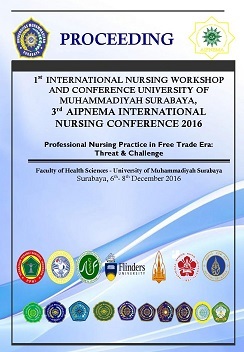The Effect Of Peer Group Chocolate Bar Exercise On Teenager: Knowledge, Attitude, And Behavior Related To HIV/AIDS Prevention
Abstrak
Introduction: the increasing number of HIV-AIDS at all ages is an event that threatens the stability of the national health. Currently, to prevent the rising number of HIV patients is a chore for health workers and the Indonesian citizens as well, including teenagers. The active role of teenager is indispensable; teens are expected to transfer their knowledge to the form of behavior in preventing of escalation the new HIV patients and eliminate discrimination and stigma in people with HIV-AIDS. Meanwhile, Peer Group "Chocolate Bar Exercise" is an activity that can be used to improve the knowledge, attitudes and behaviors related to infectious diseases. Method: pre-experimental design with pre-post test was used. Sample in this study were 36 teenagers on the range 12-18 years old who are willing to participate in the Peer Group "Chocolate Bar Exercise". Simple random sampling was used in the determination of the sample. While the instruments were Standard Operational Procedure of Peer Group "Chocolate Bar Exercise" which was adopted from the Advocates for Youth organization and modified Teens AIDS Prevention (TAP) questionnaire Survey evaluation. Wilcoxon rank and chi-square test were used to analyses. Results: The majority of teenagers were 15 (28%) and 16 (28%) years old, female (53%), education level of parents’ was junior high school, mother's occupation was labor (47%), and the father's occupation was laborer (39%). In the pretest value, majority of teens had less knowledge level (86%), and their attitude (67%) and behavioral (64%) have risk of infected with HIV-AIDS. In the post test, the majority of adolescents were knowledgeable good (75%) and their attitude (94%) and behavior (92%) were not at risk of infected HIV- AIDS. Based on the SPSS test results showed that there was a difference in the level of knowledge before and after the chocolate bar exercise (p <0.000), attitudes (p <0.000) and behavior (p <0.000) domains. Conclusion: Implementing the Peer Group "Chocolate Bar Exercise" can improve knowledge, attitude and behavior of teenagers related to HIV-AIDS prevention in Surabaya. Thus, in the future these activities can be aligned to achieving two of the three point three zero Indonesia getting MDGs namely reducing the number of new cases of HIV and eliminate discrimination and stigma can be achieved.
Â
Keywords: Teen, Chocolate Bar Exercise, knowledge, attitudes, behaviors, HIV-AIDSReferensi
Ministry of health, Republik of Indonesia. (2008). Mathematic Model of HIV Epidemic In Indonesia 2008–2014 diunduh 24/04/2015 pukul 07:38 www.aidsindonesia.or.id/…n/MOHEpidemicModel0814.pdf
Ministry of community wellbeing , Republik of Indonesia. (2010). Indonesia Monitoring and evaluation plan for HIV and AIDS 2010-2014. Diunduh 24/04/2015 pukul 07:30 www.un.or.id/…php?file=Indonesia%20Monitoring%20...
Notoatmodjo, Soekidjo. (200) the Education and behaviour of health. Rineka Cipta. Jakarta
Pollit, D. & Beck, C. (2012). Nursing Research: Generating and Assessing Evidence for Nursing Practice, 9th Ed. Philadelphia: Lippincott Williams & Wilkins
Roger, K. (2011). The human body: The reproductive system. New York: Britannica Educational Publishing.
Saifudin, A. F & Irwan, M. H. (2009). Teenager sexuality. Jakarta: Pustaka Sinar Harapan.
Santrock, J. W.(2004) Adolecense (4thEd). USA: Wm. C. Brown Publsher.
Sarwono, S. W.(2007). Teenager psychology. Jakarta: PT. Raja Grafindo Persada.
Syahredi. (2016). The factors influencing the level of kowledge and attitude in teenager toward reproduction health.. Skripsi
Syarifudin, Yudhia Fratidhina. (2009). Health promotion for midwifery students. Jakarta : TIM
Wagoner J. (2002). A guide to Implementing TAP (teens for AIDS prevention). Advocate for youth: Washington.






